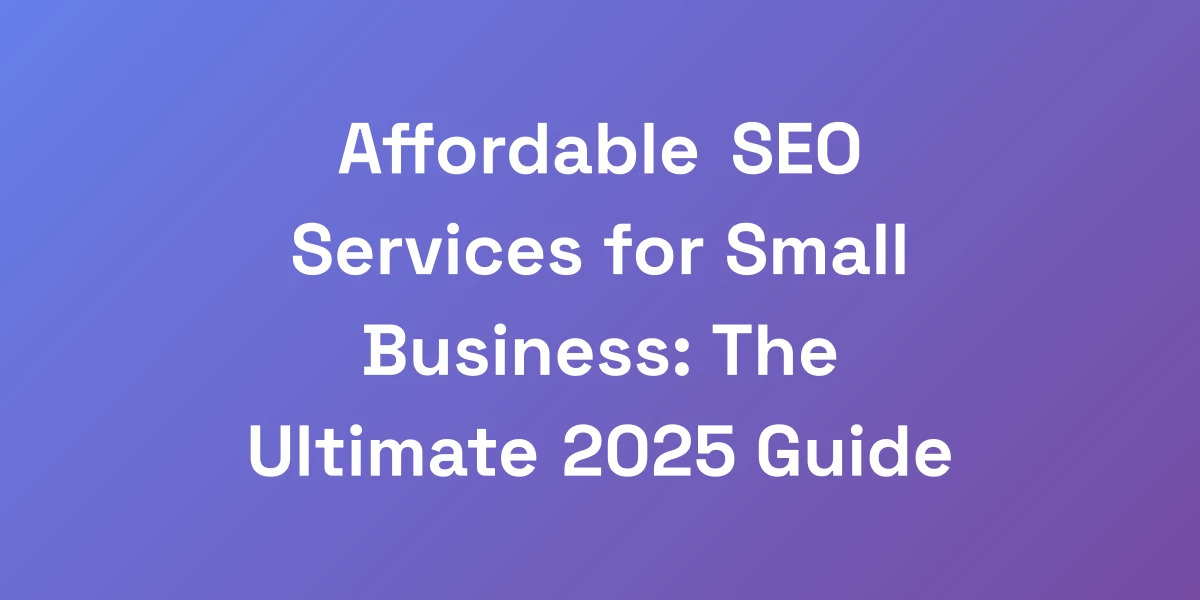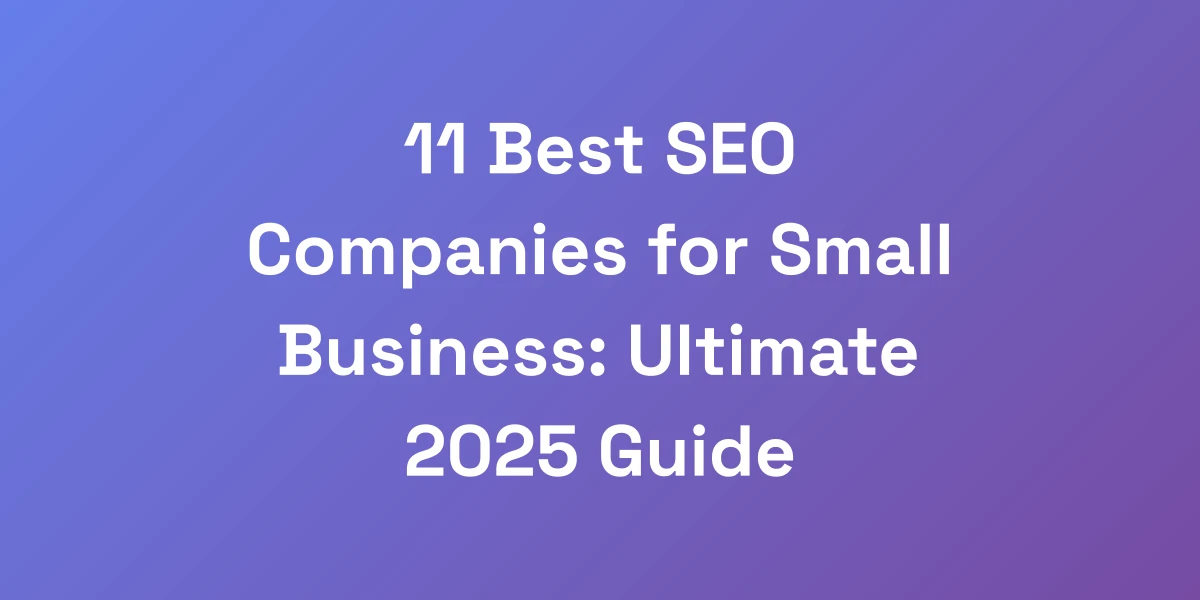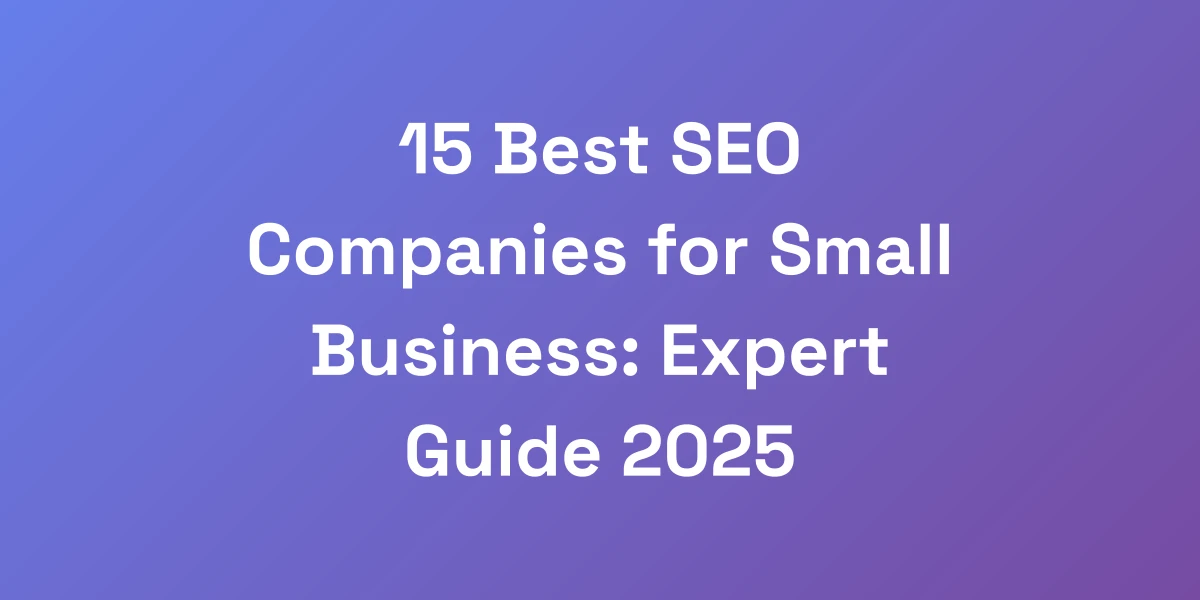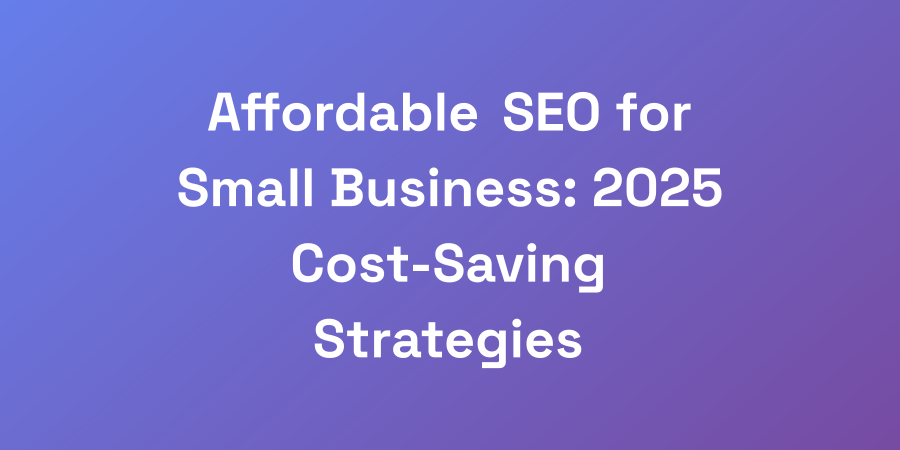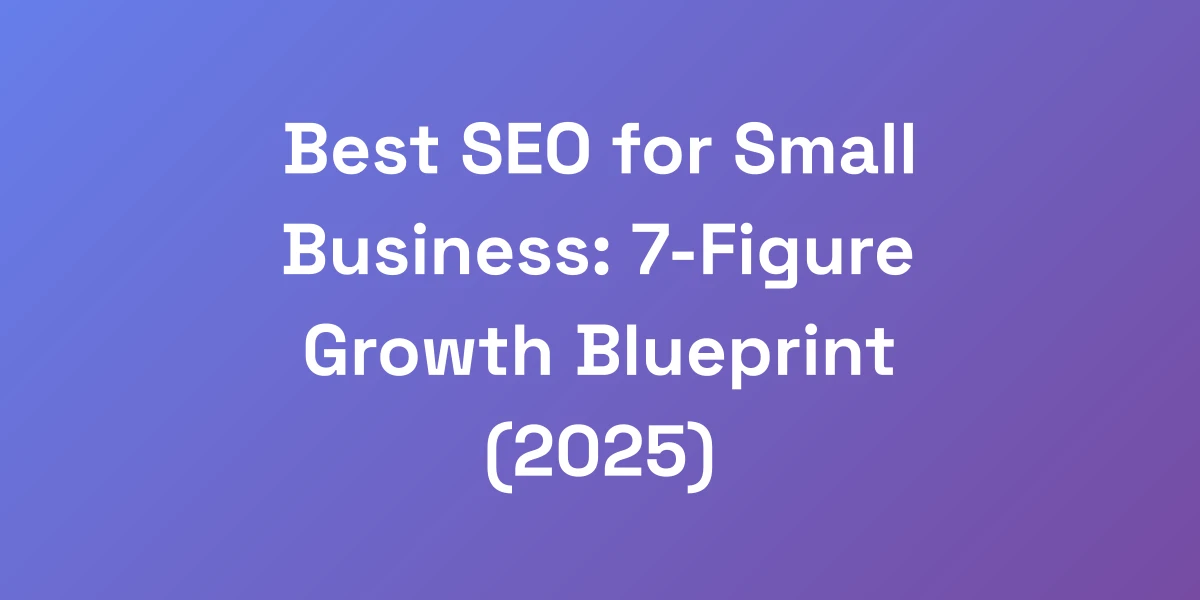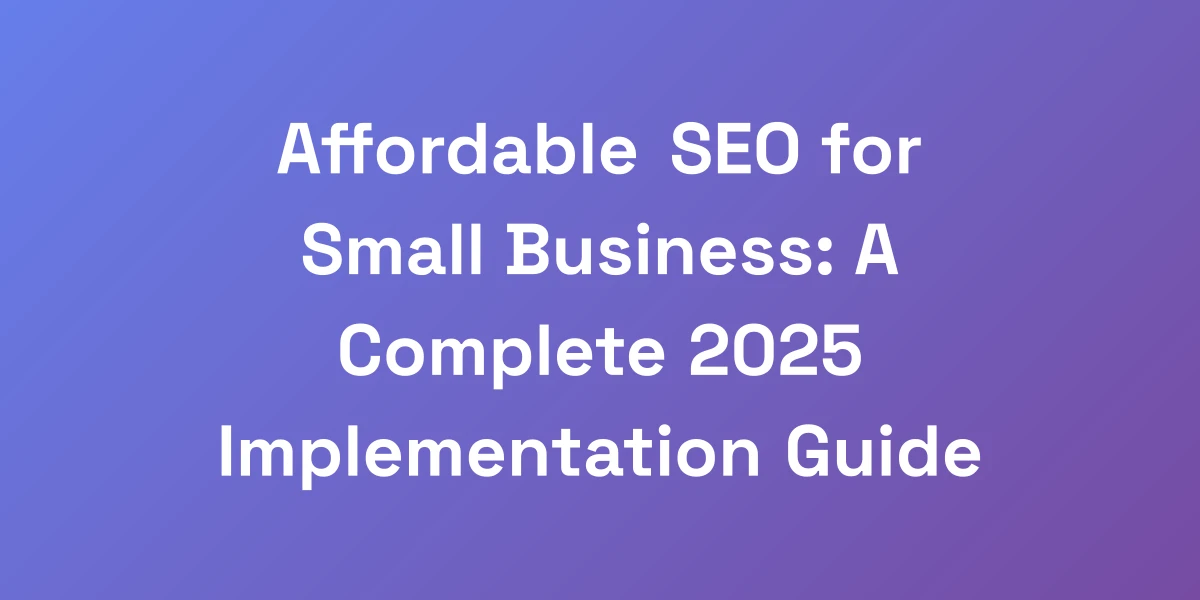
Affordable SEO for Small Business: A Complete 2025 Implementation Guide
Feb 28, 2025 | By zishansami102@gmail.com
Understanding the True Cost of SEO for Small Businesses in 2025
Ever felt overwhelmed by the sheer complexity of SEO and its associated costs?
You’re not alone. Many small business owners grapple with figuring out how much SEO costs without breaking the bank.
In 2025, navigating the real economics of SEO has become both an art and a science.
Effective SEO doesn’t always demand a hefty budget. The secret lies in understanding where your money is going and how to maximize its impact.
On average, small businesses allocate between $500-$2000 monthly for SEO services. But are you getting the best bang for your buck?
Let’s uncover the intricacies of SEO pricing, identify what truly matters, and explore strategies to ensure every dollar you spend drives meaningful results.
Breaking Down Standard SEO Pricing Models
SEO services come in various pricing models, each tailored to different business needs and budgets.
- Monthly Retainers: Typically ranging from $500 to $2000, this model offers ongoing SEO services.
- Hourly Rates: Charging between $50-$100 per hour, suitable for businesses needing specific tasks.
- Project-Based Fees: Ranging from $500 to $2000 per project, ideal for one-time SEO initiatives.
Understanding these models helps you choose the one that aligns best with your goals and financial capacity.
For instance, a monthly retainer ensures continuous optimization, while project-based fees might suit a website overhaul.
What Should Small Businesses Actually Pay for SEO?
Determining the right amount to invest in SEO hinges on your business size, market competition, and specific objectives.
- Competitive Markets: In highly competitive industries, higher investments may be necessary to stand out.
- Local vs. National: Local SEO often requires less investment compared to national SEO efforts.
- Scope of Services: Comprehensive services like technical SEO, content creation, and link building will influence costs.
For most small businesses, a budget of $1000 per month strikes a balance between affordability and effectiveness.
However, always prioritize services that offer the highest ROI, such as on-page optimization and local SEO strategies.
Red Flags in “Too Good to Be True” SEO Pricing
Beware of SEO offers that promise sky-high results for suspiciously low prices.
- Guaranteed Rankings: SEO is inherently unpredictable; no one can guarantee top rankings.
- Unsolicited Services: Be cautious of aggressive sales tactics offering unsolicited SEO services.
- Opaque Processes: Legitimate agencies are transparent about their methods and strategies.
These red flags often signal detect and avoid SEO scams or ineffective practices that can drain your resources without delivering results.
Always conduct thorough research and seek testimonials or SEO case studies before committing to any SEO service.
Understanding ROI in Small Business SEO
Return on Investment (ROI) is the cornerstone of any successful SEO strategy.
- Organic Traffic Growth: Track the increase in visitors to your website from search engines.
- Conversion Rates: Measure how effectively SEO drives sales or leads.
- Cost Per Acquisition: Determine how much you’re spending to acquire each customer through SEO efforts.
By focusing on these metrics, you can assess whether your SEO investment is paying off.
For example, if your organic traffic doubles but your conversion rate remains stable, your ROI improves as more potential customers enter your sales funnel.
Cost Comparison: DIY vs. Agency vs. Freelancer
Your SEO journey can take different paths, each with its own cost implications.
- DIY SEO: Involves leveraging free tools and learning SEO practices yourself. Costs are minimal, mainly your time and effort.
- Freelancers: Offer a middle ground with personalized services, typically ranging from $50-$100 per hour.
- Agencies: Provide comprehensive services with larger teams, priced between $1000-$2000 monthly.
Choosing between these options depends on your budget, expertise, and the level of service you require.
For businesses with limited budgets, starting with DIY and gradually incorporating freelancers might be the most sustainable approach.
Essential DIY SEO Strategies That Won’t Break the Bank
Embracing DIY SEO strategies can be a game-changer for small businesses.
These tactics are not only budget-friendly but also empower you to take control of your online presence.
From optimizing your Google My Business to crafting compelling content, let’s delve into actionable techniques you can implement without a hefty investment.
Consistency and strategic execution are your allies in this journey.
Mastering Google Business Profile Optimization
Your Google Business Profile is often the first interaction potential customers have with your business online.
- Complete Information: Ensure all sections, including business name, address, phone number, and hours, are accurately filled.
- Relevant Categories: Select appropriate categories that reflect your main services or products.
- Engaging Description: Craft a concise business description incorporating relevant keywords.
- Photos and Posts: Regularly update your profile with high-quality images and timely posts to engage users.
By optimizing your Google My Business, you enhance your visibility in local search results, making it easier for nearby customers to find you.
For instance, adding recent photos of your storefront or sharing updates about new products can attract more local traffic.
Content Creation on a Budget
Quality content is the backbone of effective SEO, and it doesn’t have to be expensive.
- Blogging: Regular blog posts targeting specific keywords can drive organic traffic.
- User-Generated Content: Encourage customers to share their experiences and reviews.
- Repurposing Content: Transform existing content into different formats, such as videos or infographics.
Focus on creating valuable, informative content that addresses your audience’s needs and questions.
For example, a local bakery could publish blog posts about unique recipes, baking tips, or the benefits of their ingredients, thereby attracting food enthusiasts searching for related topics.
Local SEO Quick Wins
Local SEO is crucial for small businesses targeting nearby customers.
- NAP Consistency: Ensure your Name, Address, and Phone number are consistent across all online platforms.
- Local Citations: Get listed in local business directories like Yelp, Bing Places, and industry-specific sites.
- Customer Reviews: Encourage satisfied customers to leave positive reviews on your Google Business Profile and other review sites.
These quick wins can significantly boost your local search rankings and drive more foot traffic to your business.
Imagine a local café that consistently updates its Google profile and gathers positive reviews, making it a go-to spot for coffee lovers in the neighborhood.
Technical SEO Basics Anyone Can Implement
Technical SEO might sound daunting, but several aspects can be managed without expert help.
- Site Speed: Optimize images, leverage browser caching, and minimize code to enhance loading times.
- Mobile-Friendliness: Ensure your website is responsive and offers a seamless experience on all devices.
- Secure Website (HTTPS): Implement SSL certificates to secure your site, which also boosts trust and rankings.
- XML Sitemaps: Create and submit an XML sitemap to help search engines crawl your site effectively.
Addressing these technical aspects can improve your site’s performance and search engine visibility.
For example, a small retail website that optimizes its images and ensures mobile compatibility can enhance user experience and rank higher in search results.
Free SEO Tools Worth Using
Leveraging the best SEO tools for small businesses can provide valuable insights and streamline your optimization efforts.
- Google Search Console: Offers insights into your site’s performance, indexing status, and keyword rankings.
- Google Analytics: Tracks website traffic, user behavior, and conversion metrics.
- Ubersuggest: Provides keyword suggestions, competitive analysis, and site audits.
- Yoast SEO (for WordPress): Helps optimize on-page SEO elements like meta descriptions and keyword usage.
These tools empower you to monitor and enhance your SEO strategy without additional costs.
For instance, using Google Analytics, you can identify which blog posts generate the most traffic and focus your content creation efforts accordingly.
Time-Saving SEO Automation Tips
Automation can streamline repetitive SEO tasks, saving you time and ensuring consistency.
- Automated Reporting: Set up regular SEO reports to track performance metrics without manual input.
- Content Scheduling: Use tools like Buffer or Hootsuite to schedule social media posts, maintaining an active online presence.
- Link Building Automation: Automatically monitor backlinks and identify new opportunities using tools like Ahrefs.
Implementing these automation tips can enhance your SEO efficiency and allow you to focus on more strategic initiatives.
Imagine scheduling your blog posts and social media updates in advance, ensuring consistent content delivery without daily oversight.
How to Choose an Affordable SEO Agency (Without Compromising Quality)
Partnering with the right SEO agency can propel your small business to new heights.
However, finding an affordable yet effective agency requires careful evaluation and discernment.
Through extensive experience and research, we’ve developed a framework to help you identify affordable SEO services that deliver real results.
Let’s explore the critical criteria for selecting the perfect SEO partner tailored to your business needs.
Essential Questions to Ask Potential SEO Partners
Engaging with an SEO agency starts with asking the right questions to gauge their expertise and compatibility.
- What is your SEO strategy? Understand their approach to on-page, off-page, and technical SEO.
- Can you provide case studies or references? Verify their track record with real-world examples.
- How do you measure success? Ensure they focus on metrics that align with your goals.
- What is your reporting process? Confirm regular and transparent communication.
These questions help you assess whether the agency’s methods align with your business objectives and values.
For example, an agency that prioritizes sustainable SEO practices over quick fixes is likely to offer long-term benefits.
Comparing Service Packages and Deliverables
Different agencies offer varied service packages tailored to diverse business needs.
- Comprehensive Packages: Include a wide range of services like keyword research, content creation, and link building.
- Specialized Services: Focus on specific areas such as local SEO, technical SEO, or e-commerce SEO.
- Custom Solutions: Tailored strategies addressing unique business challenges and goals.
When comparing packages, consider the specific deliverables and how they align with your SEO priorities.
For instance, if local visibility is your primary goal, prioritize agencies offering robust local SEO services.
Reading Between the Lines of Case Studies
Case studies provide a window into an agency’s past performance and client satisfaction.
- Client Background: Ensure their success stories are relevant to businesses similar to yours.
- Results Achieved: Look for tangible outcomes like traffic growth, improved rankings, and increased conversions.
- Duration of Campaigns: Understand the time frames required to achieve the results showcased.
Analyzing case studies helps you set realistic expectations and identify agencies capable of delivering comparable results for your business.
For example, an agency that helped a local retailer increase organic traffic by 200% in six months demonstrates effective strategies applicable to similar businesses.
Contract Terms and Red Flags to Watch For
Before signing on with an SEO agency, scrutinize the contract terms to avoid potential pitfalls.
- Guaranteed Results: Be wary of contracts promising specific rankings or traffic numbers.
- Flexibility: Ensure the contract allows for adjustments based on performance and changing business needs.
- Termination Clauses: Understand the conditions under which you can terminate the agreement without hefty penalties.
Red flags like long-term commitments without clear performance metrics or hidden fees can lead to unnecessary expenses and frustrations.
Always prioritize contracts that offer transparency, flexibility, and align with your business objectives.
Building a Long-term SEO Partnership
SEO is a continuous process that benefits from a long-term partnership with your agency.
- Consistent Communication: Establish regular check-ins and updates to stay aligned on progress and strategies.
- Collaborative Approach: Work together to set goals, share insights, and adjust strategies as needed.
- Ongoing Optimization: Ensure the agency continually refines and adapts your SEO strategy based on performance data and industry changes.
A strong partnership fosters trust, encourages proactive problem-solving, and drives sustained SEO success.
Imagine working closely with your agency to pivot strategies based on seasonal trends, ensuring your business remains competitive year-round.
When to Scale Up Your SEO Investment
Knowing when to increase your SEO budget is crucial for ongoing growth.
- Achieving Initial Goals: Once foundational SEO goals are met, scaling can drive further growth.
- Expanding Business Operations: Reach new markets or launch new products with enhanced SEO efforts.
- Enhanced ROI: When your current SEO investments consistently yield positive returns, consider scaling up for even greater impact.
Scaling up ensures your SEO strategy evolves alongside your business, maintaining momentum and competitiveness.
For example, if a local bakery’s SEO efforts lead to a steady increase in online orders, increasing the budget can help capture a broader audience and boost sales further.
Measuring and Maximizing Your SEO ROI
Ensuring that your SEO investment delivers tangible value is paramount for small businesses.
By adopting a systematic approach to tracking and optimizing SEO performance, you can maximize your ROI and refine your strategies for continuous improvement.
Let’s explore effective methods to measure and enhance your SEO ROI.
Setting Realistic SEO Goals and Timelines
Establishing clear, achievable goals sets the foundation for your SEO strategy.
- Traffic Targets: Define specific numbers for organic traffic growth.
- Keyword Rankings: Aim for improvements in your target keywords’ positions on search engines.
- Conversion Rates: Set goals for increasing sales, leads, or other key conversion metrics.
Realistic timelines help manage expectations and provide benchmarks for measuring progress.
For instance, setting a goal to increase organic traffic by 50% within six months is both ambitious and attainable with consistent effort.
Essential KPIs for Small Business SEO
Key Performance Indicators (KPIs) are essential for tracking the effectiveness of your SEO efforts.
- Organic Traffic: Measures the number of visitors arriving via search engines.
- Bounce Rate: Indicates the percentage of visitors who leave without engaging further.
- Conversion Rate: Tracks how many visitors complete desired actions, such as purchases or sign-ups.
- Keyword Rankings: Monitors the positions of your target keywords in search results.
- Backlink Quality: Assesses the number and authority of external links pointing to your site.
These KPIs provide a comprehensive view of your SEO performance and highlight areas for improvement.
For example, a declining bounce rate coupled with rising conversion rates signals that your SEO efforts are attracting more relevant and engaged traffic.
Tools for Tracking SEO Progress
Utilizing the right tools can streamline the process of tracking and analyzing your SEO performance.
- Google Analytics: Offers in-depth insights into website traffic, user behavior, and conversion metrics.
- Google Search Console: Provides data on search performance, indexing status, and keyword performance.
- SEMrush: Tracks keyword rankings, competitor analysis, and backlink profiles.
- Ahrefs: Monitors backlink quality, keyword rankings, and site audits.
These tools empower you to make informed decisions based on accurate and comprehensive data.
For example, using SEMrush to track keyword rankings can help you identify which strategies are driving top positions and which need adjustment.
Monthly Reporting and Analysis
Regular reporting keeps you informed about your SEO progress and identifies trends that inform future strategies.
- Traffic Reports: Analyze changes in organic traffic over time.
- Keyword Performance: Track shifts in keyword rankings and identify emerging opportunities.
- Conversion Metrics: Evaluate how SEO efforts translate into tangible business outcomes.
Consistent analysis allows you to recognize patterns, capitalize on successes, and address areas needing improvement.
For instance, if monthly reports show a spike in traffic from a specific keyword, consider creating more content around that topic to sustain the momentum.
Adjusting Strategy Based on Results
SEO is a dynamic field that demands adaptability and continuous refinement.
- Performance Insights: Use data to identify what’s working and what isn’t.
- Strategic Tweaks: Modify your approach based on performance metrics, such as focusing more on high-performing keywords.
- Market Trends: Stay updated with industry changes and adjust your strategy to remain competitive.
Being proactive in adjusting your strategy ensures your SEO efforts remain effective and aligned with your business goals.
For example, if a competitor starts ranking higher for a key term, analyze their strategy and adapt your tactics to regain your position.
Scaling Success: When and How to Expand
Recognizing when to scale your SEO efforts is crucial for sustained growth.
- Consistent Positive ROI: Scale up when your SEO investment consistently yields positive returns.
- Business Growth: Expand your SEO efforts in tandem with your business growth and market expansion.
- New Opportunities: Capitalize on emerging trends or opportunities identified through performance analysis.
Scaling strategically ensures your SEO efforts evolve with your business, maintaining momentum and competitiveness.
For example, if your local SEO efforts lead to dominating local search results, consider expanding to regional or national SEO to tap into broader markets.
Conclusion
Embarking on an affordable SEO journey for your small business in 2025 is not only feasible but also highly rewarding.
By understanding the true cost of SEO, implementing effective DIY strategies, choosing the right agency, and meticulously measuring your ROI, you can navigate the digital landscape with confidence.
Remember, SEO is a long-term investment that, when executed thoughtfully, can transform your online presence and drive substantial growth.
Ready to elevate your small business with affordable SEO? Start by assessing your current SEO efforts, set clear goals, and apply the strategies we’ve outlined.
We’d love to hear about your SEO journey and the successes you achieve. Share your experiences or ask questions in the comments below!
